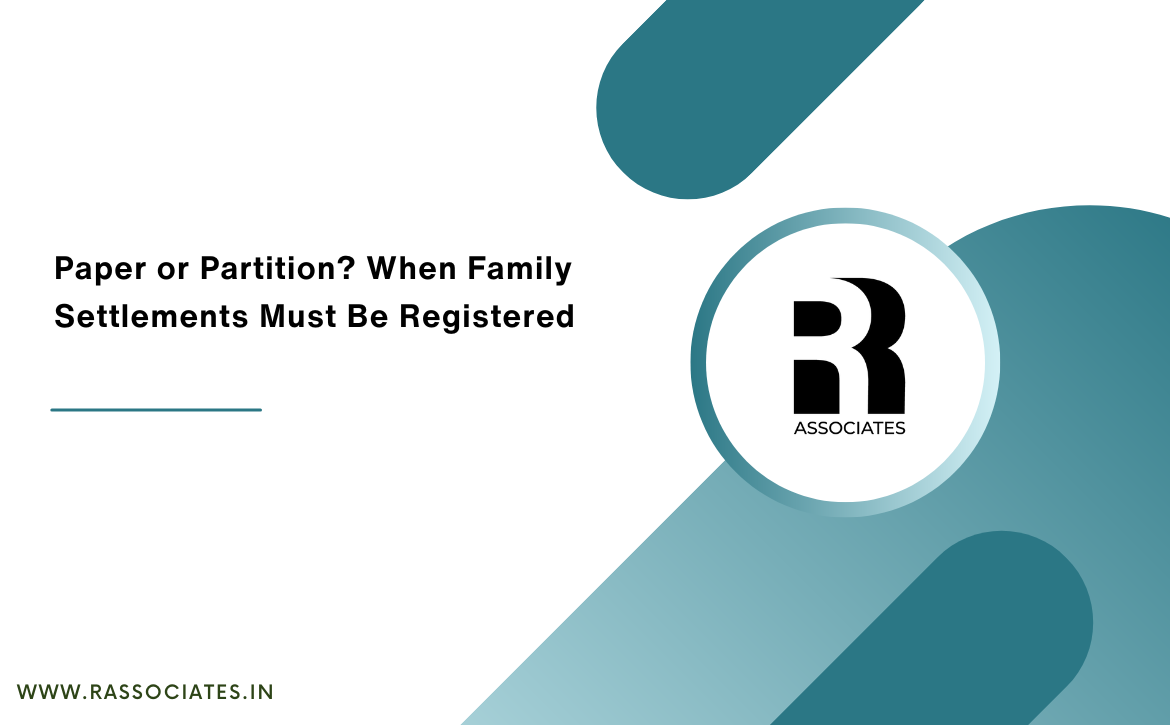
Paper or Partition? When Family Settlements Must Be Registered
Families divide property all the time. Sometimes it’s an oral bargain at the puja; sometimes it’s a written note signed by elders and called a memorandum of family arrangement. Other times the parties execute a formal partition deed and move to register it at the Sub-Registrar. Which of those papers must be registered?
This question matters in Delhi, not only for legal validity, but because registration and stamp duty (and the risk of a document being held inadmissible) have real financial and practical consequences for co-owners and heirs. Documents that themselves create, assign, limit or extinguish rights in immovable property are compulsorily registrable under Section 17 of the Registration Act.
Memorandum of Family Arrangement vs. Partition Deed
The legal distinction rests on whether the document itself changes ownership rights or merely records an arrangement already concluded. Courts — including the Delhi High Court and the Supreme Court — have consistently applied this test.
- Memorandum of Family Arrangement (MOFA):
A memorandum only records that a family settlement has taken place. If the arrangement was oral, acted upon, and accepted by all members, a written memorandum is treated as a record of a past transaction. Such a memorandum does not require compulsory registration under Section 17 of the Registration Act. It serves as evidence of the family settlement but does not, by itself, transfer property. Delhi courts have upheld this principle, provided the writing is not couched in terms that itself “allots” or “conveys” ownership. - Partition Deed:
A partition deed, on the other hand, is an instrument of title. If co-owners divide immovable property through a written deed, that deed creates and defines rights in the property. Under Section 17(1)(b) of the Registration Act, 1908, and Section 35 of the Delhi Stamp Act, such a deed must be registered. An unregistered partition deed is inadmissible as evidence and cannot be relied upon to prove title in a Delhi court.
In practical terms:
- If the family had already divided property orally and possession reflects that, a later memorandum of family arrangement is enough and need not be registered.
- If the parties are using a written deed to effect division for the first time, it is a partition deed registration case and registration is mandatory.
This “operative effect vs. record” test has been applied in landmark judgments such as Kale & Ors. v. Deputy Director of Consolidation (1976) [1] and followed by Delhi High Court in subsequent property disputes.
Registration Requirements in Delhi
In Delhi, the distinction between family settlement registration and partition deed registration becomes more than theory because it ties directly into stamp duty, registration costs, and enforceability in court.
Partition Deed Registration in Delhi
- Stamp Duty: A partition deed attracts stamp duty based on the market value of the separated share. Under the Delhi Stamp Act, duty is typically calculated at 2% of the separated share when property is partitioned among family members, though exemptions exist in transfers between certain classes of heirs (like parents and children, or among siblings).
- Registration Process: The deed must be presented at the Sub-Registrar’s office in whose jurisdiction the property falls. All co-owners should be present with original ID, photographs, and proof of ownership.
- Consequences of Non-Registration: An unregistered partition deed cannot be admitted as evidence of title or property rights in court. At best, it may be looked at for collateral purposes (such as showing possession), but not for establishing ownership.
Family Settlement Registration in Delhi
- When It’s Not Required: A simple memorandum of family arrangement that only records an already completed oral settlement does not require registration or stamp duty. It is admissible in Delhi courts as evidence of a past arrangement.
- When It Becomes Mandatory: If the memorandum itself “allots” property or operates as a conveyance, registration is compulsory. Courts will look at the wording — phrases like “hereby gives” or “hereby transfers” often convert what looks like a memorandum into a partition deed in disguise.
- Stamp Duty Position: If registration becomes necessary, the document will be treated like a partition deed and charged duty accordingly.
FAQs
1. Is family settlement registration in Delhi always mandatory?
No. If the settlement was oral and later recorded in a memorandum, registration is not mandatory. Registration is required only when the document itself divides or transfers ownership in immovable property.
2. What is the difference between a memorandum of family arrangement and a partition deed?
A memorandum of family arrangement records an already concluded oral division, while a partition deed is the instrument that actually effects the division. The former may not need registration; the latter always does.
3. What happens if a partition deed is not registered in Delhi?
An unregistered partition deed is inadmissible as evidence of ownership in court. At best, it can be used for collateral purposes like showing possession, but it cannot establish title.
4. What stamp duty is payable on partition deed registration in Delhi?
Stamp duty is typically 2% of the separated share’s market value when partition is among family members. However, concessions and exemptions may apply in certain cases of partition among immediate heirs.
5. Can banks or buyers accept a memorandum of family arrangement as proof of title?
Generally, financial institutions and purchasers prefer registered partition deeds because they create a clear chain of title. A memorandum may be valid in law but often faces practical hurdles in transactions.
6. Should I consult a lawyer before executing a family settlement?
Yes. Because Delhi courts look at the substance of the document and not just its title, professional drafting ensures the arrangement will hold up legally and prevent future disputes.
Conclusion
In Delhi’s property landscape, the difference between a memorandum of family arrangement and a partition deed is not just academic. It decides whether your document is enforceable or a dead letter in court.
Families often believe that a signed paper, even if unregistered, is enough to avoid future disputes. In reality, unless the document is correctly categorized and, where necessary, registered with the Sub-Registrar, the settlement risks collapsing at the first sign of conflict.
[1] 1976 SCC (3) 119




